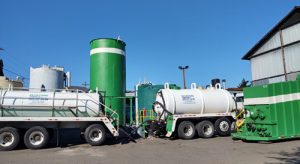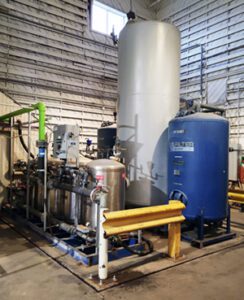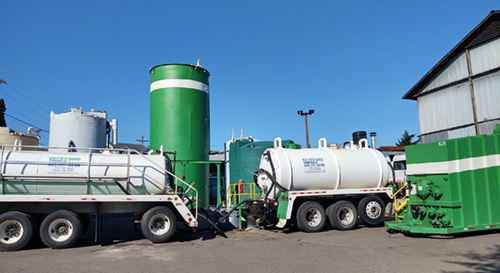
After years of work and the acquisition of specialized equipment and experience, Washington Marine Cleaning has commenced operation of a new industrial wastewater pretreatment facility and associated laboratory at the company’s Everett, Wash. location.
The pretreatment facility’s opening has brought a new outlet in the Pacific Northwest for nonhazardous, oily and industrial waste streams emanating from ship bilges and tanks, as well as other maritime sources.
Washington Marine Cleaning received an industrial waste discharge permit by the City of Everett in October, 2020, enabling the company to provide centralized waste treatment services to the Pacific Northwest and beyond. Since then however, the facility has only had a soft opening, as it awaits full accreditation for its analysis laboratory, where samples of all loads are first analyzed at a full-service on-site lab.
“We’ve been open, but we’ve been open very gingerly,” WMC Production Manager Gary Baldwin explained to Pacific Maritime. “We want to start slowly, make sure we’re doing it right.”
WMC currently receives non-hazardous industrial wastewaters from a variety of sources including, but not limited to, ships, oil storage facilities, construction sites, demolitions operations and spill clean ups. The company has been pumping and cleaning ship bilges and tanks, performing all types of industrial cleaning processes since 2002.
“We’ve had a permit for quite a while where we can treat waste that we produce onsite and then have an analytic approve it’s cleaning and send it down the sewer,” Baldwin said. “But now we can take offsite waste; we have a centralized waste treatment permit.”
“Starting to do water treatment and receiving our permit, it’s allowed us to become a one stop shop for tank cleaning and the (other) services that we provide to our customers,” he added.
So what exactly is pretreatment? Waste waters other than sewage must first be treated before being discharged to any municipal sewage system. Industrial waste waters contaminated with oils and heavy metals must first go through a process called pretreatment to remove the contaminants.
Washington Marine and a few businesses located in South Seattle and further out have the ability and expertise to treat contaminated waters for discharge to municipal sewage systems. WMC, however, is the only pretreatment facility in Snohomish County, and company officials have said that WMC brings particular value to the North Puget Sound as the only centralized waste treatment facility north of Seattle.
“Us being north of Seattle…any customer that’s north of us and anywhere around us that’s paying to have tankers taken all the way down to Seattle and Tacoma need to know we’re here,” Baldwin said. “We’re a local company providing local abilities.”
Baldwin said the pretreatment facility had been in the works for at least 15 years before it was built.
“Over $2 million has been invested here,” Baldwin said. “And 20 years of blood, sweat and tears. There’s got to be close to a million (dollars invested) just in the lab.”

“We have to be able to take a sample of water, identify who’s bringing what in, and making sure what they’re bringing in is what they said they brought in. And then we need to make sure the water’s clean enough to go down the sewer as per the permit standards.”
“If you go to an independent lab, you can never get it done as quick as you like, and if you want it done that quick, prices can triple,” he added.
WMC chemist Julia Redfield told Pacific Maritime that the laboratory has been going through the accreditation process for over 10 months, but that she expects the laboratory to receive full accreditation for compliance and treatability within the next few months, possibly in time for the company’s 20th anniversary in the spring of 2022.
Sometime after that, a ribbon cutting is expected to be held, Baldwin said.
WMC is a subsidiary of San Diego-based California Marine Cleaning, a nearly 40-year-old company that also counts Alaska Marine Cleaning and Hawaii Marine Cleaning as subsidiaries.
WMC’s customer base includes the U.S. Navy, Washington State Ferries, the U.S. Coast Guard, Swissport Fueling and Crowley Fuel Services, among others. Baldwin said that his company has worked hard to establish and maintain a reputation as being environmentally responsible.
“I know when people think of treatment plants, they think of stink and pollution. We work hard to avoid that,” he said, explaining that among the equipment the facility uses are airstones, which create a steady stream of small bubbles and aid water circulation within tanks in order to negate bad odors. Similar versions of the devices are typically used in household aquariums.
“We’re as advanced as we can get,” he remarked. “We work hard to be clean.”

